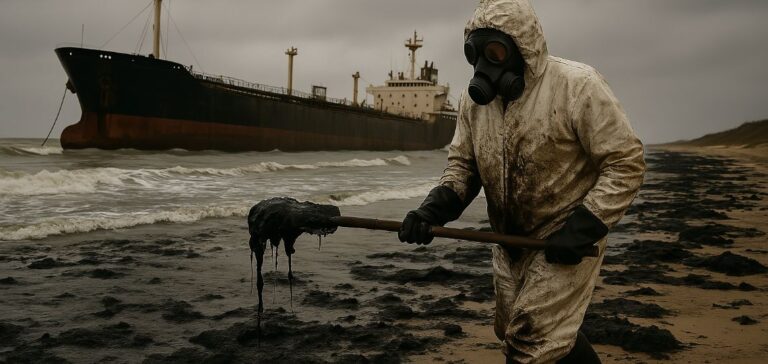Russian authorities have assessed the damages caused by a mid-December oil spill in the Kerch Strait, between south-western Russia and the Crimean Peninsula, at RUB84.9bn (approximately €903mn). According to Svetlana Radionova, Director of the Federal Service for Supervision of Natural Resources (Rosprirodnadzor), the companies owning the two tankers have one month to pay the amount to the state. Legal action will follow in the event of non-payment.
The two vessels were carrying over 9,000 tonnes of fuel oil when they ran aground during a winter storm. The incident led to a large-scale oil discharge, significantly affecting the beaches of the Krasnodar Krai and Crimea, a territory annexed by Russia in 2014. Cleanup operations mobilised local teams and volunteers to collect tonnes of contaminated sand and pump out the remaining hydrocarbons aboard the Volgoneft-239 tanker.
Unauthorised navigation and contested management
The Federal Service for Supervision in the Sphere of Transport (Rostransnadzor) confirmed that the vessels were not authorised to operate in this maritime zone during that period. Despite forecasts of adverse weather conditions, the tankers continued their course, breaching winter navigation safety regulations. The breakdown in operational oversight has revived scrutiny of maritime regulatory practices in the Black Sea.
President Vladimir Putin described the incident as an “ecological disaster” while criticising the local authorities for their lack of responsiveness. Several cetaceans, including porpoises, were reported dead along the affected coasts, according to Russian environmental associations. Immediate environmental impacts were not addressed by the judicial authorities handling the dispute.
Pressure on industrial accountability
The amount demanded by Rosprirodnadzor represents one of the heaviest financial penalties imposed on maritime operators in the region. However, the names of the companies involved were not disclosed by the authorities. This omission raises concerns about the transparency of the regulatory process, particularly where oversight agencies and maritime operators maintain close ties.
The handling of the disaster highlights governance issues in an environmentally and geopolitically sensitive zone. As legal proceedings are declared unavoidable in the absence of payment, the absence of prior administrative sanctions is prompting allegations of a potential conflict of interest between regulators and actors in the maritime oil sector.






















